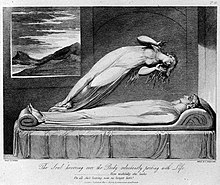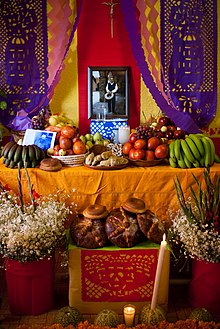Portal:Religion
The Religion Portal
Religion is a range of social-cultural systems, including designated behaviors and practices, morals, beliefs, worldviews, texts, sanctified places, prophecies, ethics, or organizations, that generally relate humanity to supernatural, transcendental, and spiritual elements—although there is no scholarly consensus over what precisely constitutes a religion. Different religions may or may not contain various elements ranging from the divine, sacredness, faith, and a supernatural being or beings. (Full article...)
 Vital article
Vital article

In many religious and philosophical traditions, the soul is the non-material essence of a person, which includes one's identity, personality, and memories, an immaterial aspect or essence of a living being that is believed to be able to survive physical death. The concept of the soul is generally applied to humans, although it can also be applied to other living or even non-living entities, as in animism. (Full article...)
 Did you know (auto-generated)
Did you know (auto-generated)
- ... that the capital of South Ossetia once had more Jews than Ossetians?
- ... that Gamaliel's principle has been used to support religious pluralism and reforms within religious groups?
- ... that a religious community is a group of people who practice the same religion, but do not have to live together?
- ... that fictional religions, often described in speculative fiction, have in some cases inspired real religious movements?
- ... that the Grave with the Hands commemorates a married couple, divided by society and religion, with hands clasped over a cemetery wall after death?
- ... that Gherardo Gambelli, the incoming archbishop of Florence, served as a prison chaplain in Chad for over a decade?

Egyptian temples were built for the official worship of the gods and in commemoration of the pharaohs in ancient Egypt and regions under Egyptian control. Temples were seen as houses for the gods or kings to whom they were dedicated. Within them, the Egyptians performed a variety of rituals, the central functions of Egyptian religion: giving offerings to the gods, reenacting their mythological interactions through festivals, and warding off the forces of chaos. These rituals were seen as necessary for the gods to continue to uphold maat, the divine order of the universe. Housing and caring for the gods were the obligations of pharaohs, who therefore dedicated prodigious resources to temple construction and maintenance. Pharaohs delegated most of their ritual duties to a host of priests, but most of the populace was excluded from direct participation in ceremonies and forbidden to enter a temple's most sacred areas. Nevertheless, a temple was an important religious site for all classes of Egyptians, who went there to pray, give offerings, and seek oracular guidance from the god dwelling within. (Full article...)


































































